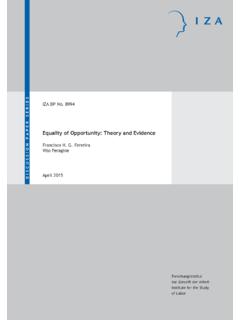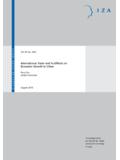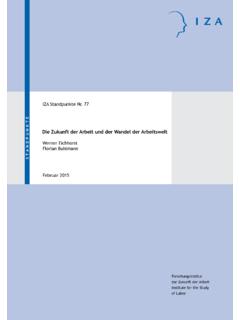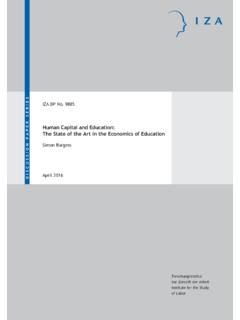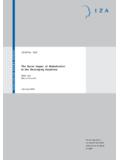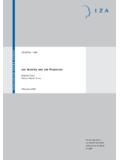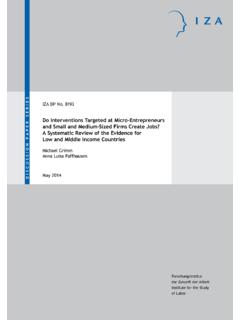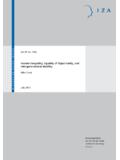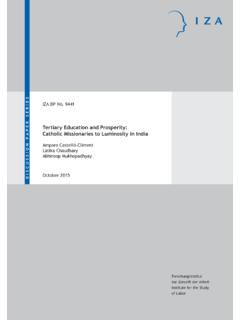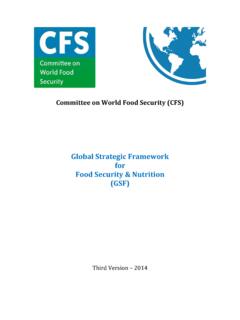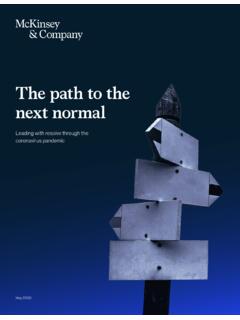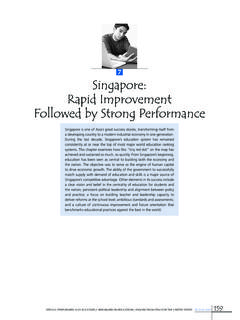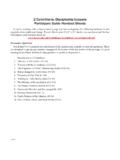Transcription of The Great Recession of 2008-2009: Causes, Consequences …
1 DISCUSSION PAPER SERIESF orschungsinstitut zur Zukunft der ArbeitInstitute for the Study of Labor The Great Recession of 2008-2009: Causes, Consequences and Policy ResponsesIZA DP No. 4934 May 2010 Sher VerickIyanatul Islam The Great Recession of 2008-2009: Causes, Consequences and Policy Responses Sher Verick International Labour Office (ILO) and IZA Iyanatul Islam International Labour Office (ILO) and Griffith University Discussion Paper No. 4934 May 2010 IZA Box 7240 53072 Bonn Germany Phone: +49-228-3894-0 Fax: +49-228-3894-180 E-mail: Any opinions expressed here are those of the author(s) and not those of IZA.
2 Research published in this series may include views on policy, but the institute itself takes no institutional policy positions. The Institute for the Study of Labor (IZA) in Bonn is a local and virtual international research center and a place of communication between science, politics and business. IZA is an independent nonprofit organization supported by Deutsche Post Foundation. The center is associated with the University of Bonn and offers a stimulating research environment through its international network, workshops and conferences, data service, project support, research visits and doctoral program. IZA engages in (i) original and internationally competitive research in all fields of labor economics, (ii) development of policy concepts, and (iii) dissemination of research results and concepts to the interested public.
3 IZA Discussion Papers often represent preliminary work and are circulated to encourage discussion. Citation of such a paper should account for its provisional character. A revised version may be available directly from the author. IZA Discussion Paper No. 4934 May 2010 ABSTRACT The Great Recession of 2008-2009: Causes, Consequences and Policy Responses* Starting in mid-2007, the global financial crisis quickly metamorphosed from the bursting of the housing bubble in the US to the worst Recession the world has witnessed for over six decades. Through an in-depth review of the crisis in terms of the causes, Consequences and policy responses, this paper identifies four key messages.
4 Firstly, contrary to widely-held perceptions during the boom years before the crisis , the paper underscores that the global economy was by no means as stable as suggested, while at the same time the majority of the world s poor had benefited insufficiently from stronger economic growth. Secondly, there were complex and interlinked factors behind the emergence of the crisis in 2007, namely loose monetary policy, global imbalances, misperception of risk and lax financial regulation. Thirdly, beyond the aggregate picture of economic collapse and rising unemployment, this paper stresses that the impact of the crisis is rather diverse, reflecting differences in initial conditions, transmission channels and vulnerabilities of economies, along with the role of government policy in mitigating the downturn.
5 Fourthly, while the recovery phase has commenced, a number of risks remain that could derail improvements in economies and hinder efforts to ensure that the recovery is accompanied by job creation. These risks pertain in particular to the challenges of dealing with public debt and continuing global imbalances. JEL Classification: E24, E60, G01, J08, J60 Keywords: global financial crisis , unemployment, macroeconomic policy, labour market policy Corresponding author: Sher Verick Employment Analysis and Research Unit (EMP/ANALYSIS) International Labour Office (ILO) 4 route des Morillons CH-1211 Gen ve 22 Switzerland E-mail: * The paper benefited enormously from comments by Sameer Khatiwada and Uma Rani and research assistance provided by Leyla Shamchiyeva, Sarah Anwar and Tara Scharf.
6 The views in this paper are those of the authors and do not necessarily represent those of the International Labour Organization (ILO). 3 1 Introduction The global financial crisis of 2007 has cast its long shadow on the economic fortunes of many countries, resulting in what has often been called the Great Recession .1 What started as seemingly isolated turbulence in the sub-prime segment of the US housing market mutated into a full blown Recession by the end of 2007. The old proverbial truth that the rest of the world sneezes when the US catches a cold appeared to be vindicated as systemically important economies in the European Union and Japan went collectively into Recession by mid-2008.
7 Overall, 2009 was the first year since world War II that the world was in Recession , a calamitous turn around on the boom years of 2002-2007. The crisis came largely as a surprise to many policymakers, multilateral agencies, academics and investors. On the eve of the outbreak of the financial crisis , Jean-Philippe Cotis of the OECD (2007) declared: ..for the OECD area as a whole growth is set to exceed its potential rate for the remainder of 2007 and 2008, supported by buoyancy in emerging market economies and favourable financial conditions . In the wake of the global Recession of 2008-2009, the economics profession has come under a Great deal of criticism from leading scholars.
8 Krugman (2009a) chides fellow economists for their ..blindness to the very possibility of catastrophic failures in a market economy . Galbraith (2009) offers a robust critique of the economics profession and argues that both explicit and implicit intellectual collusion made it difficult for the leading members of the profession (invariably associated with elite American universities) to encourage a genuine discourse based on alternative views. The result was that a rather limited intellectual conversation took place between essentially like-minded scholars. Therefore, it is not surprising that, for much of 2008, the severity of this global downturn was underestimated.
9 Subsequently, leading forecasters, including the IMF and world Bank, made a number of revisions to its growth forecasts during 2008 and into 2009 as the magnitude of the crisis Of course, there were some voices that issued dire warnings of a brewing storm, but they were not enough to catch the attention of many who were lulled into a 1 Rampell (2009) traces the evolution of the term and points out with some irony that it has also been used to describe all post-war recessions . Reinhart and Rogoff (2009) refer to the crisis as the Second Great Contraction . 2 See IMF (2009c) 4 collective sense of complacency in the years leading up to the crisis .
10 Some policymakers, after being caught by surprise at the seemingly sudden appearance of a global downturn, confidently noted that nobody could have predicted the crisis . Thus Glenn Stevens (2008), Governor of the Reserve Bank of Australia observed: I do not know anyone who predicted the course of events . Yet, there were economists and other professional analysts, albeit small in numbers, who were prescient enough to issue a warning about a gathering storm. One paper (Bezemer 2009a: table 1, ) claims that 12 economists and professional analysts predicted (between 2005 and 2007) a likely Recession based on models in which private sector debt accumulation played a major role,3 while another cites an even smaller number (Foreign Policy 2009).
